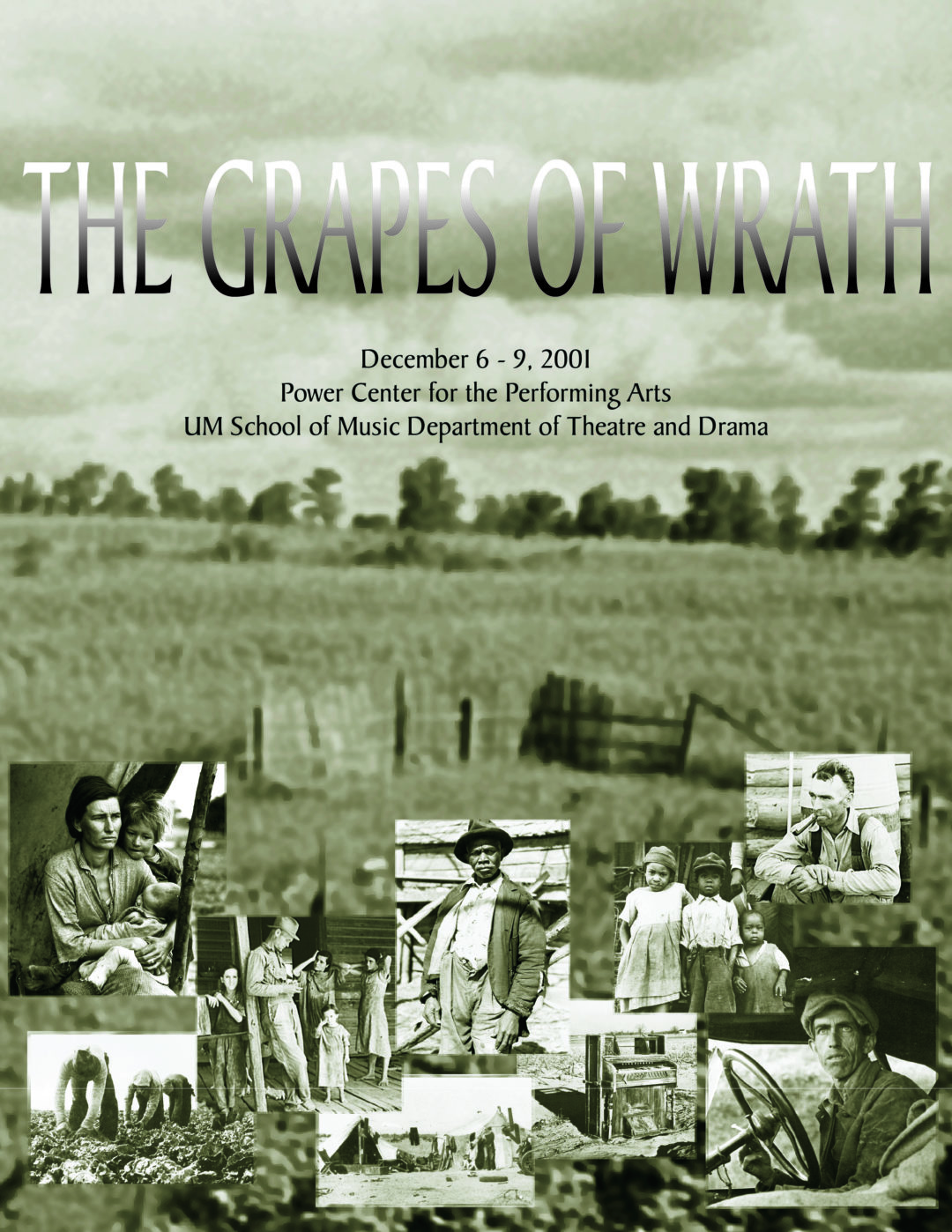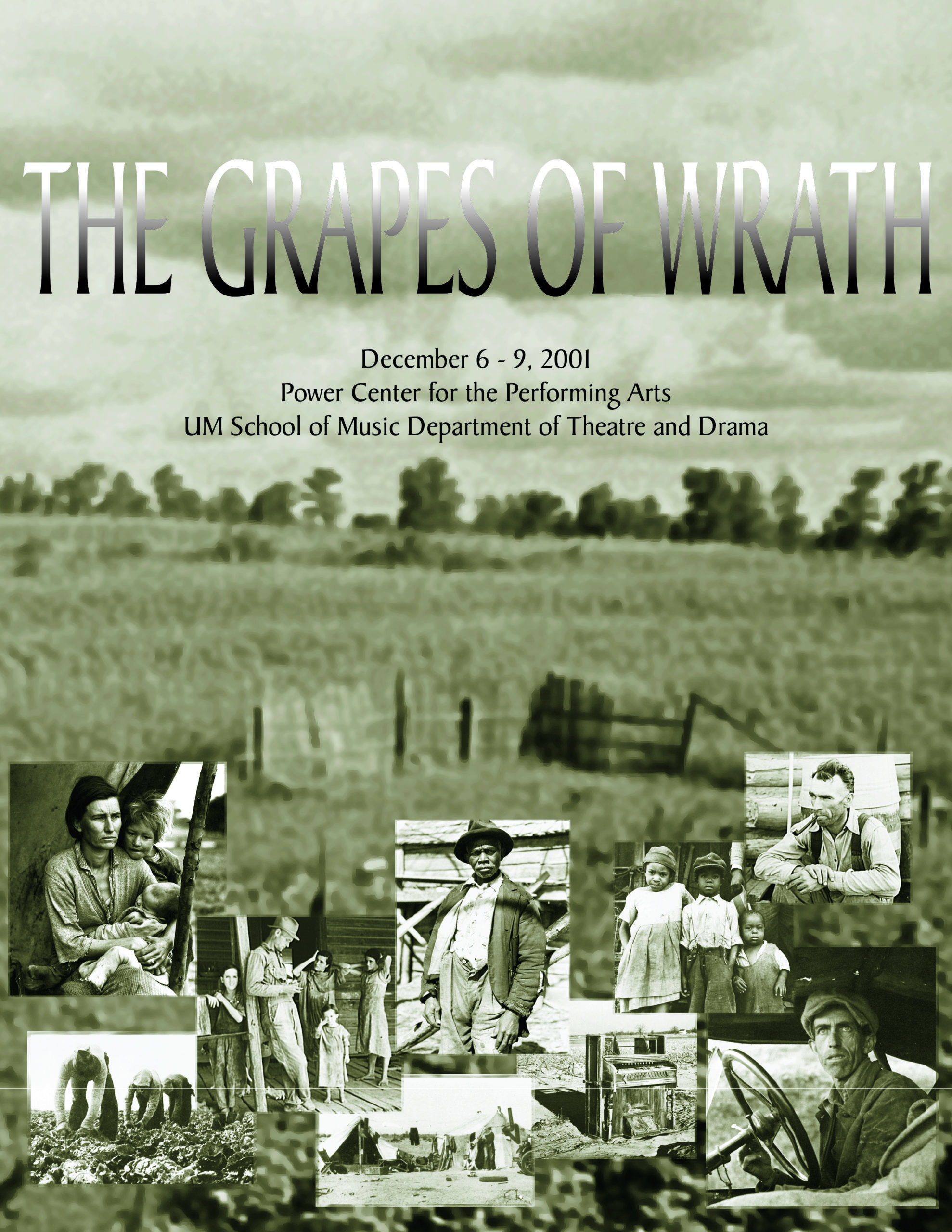The Grapes of Wrath
By Frank Galati
Based on the novel by John Steinbeck
Department of Theatre & Drama
December 6-9, 2001 • Power Center
Renowned first as a novel, and then as a prize-winning motion picture, the story of the Joad family and their flight from the dust bowl of Oklahoma is familiar to all. Desperately proud, but reduced to poverty by the loss of their farm, the Joads pile their few possessions on a battered old truck and head west for California, hoping to find work and a better life. Led by the indomitable Ma Joad, who is determined to keep the family together at any cost, and by the volatile young Tom Joad, an ex-convict who grows increasingly impatient with the intolerance and exploitation which they encounter on their trek, the Joads must deal with death and terrible deprivation before reaching their destination–where their waning hopes are dealt a final blow by the stark realities of the Great Depression. And yet, despite the anguish and suffering which it depicts, the play becomes in the final essence a soaring and deeply moving affirmation of the indomitability of the human spirit, and of the essential goodness and strength which–then as now–resides in the hearts and minds of the “common man,” throughout the world.
Holding to the simplicity and directness of the original novel, the play uses the sparest of technical means to convey its timeless message of the persistence and strength of the human spirit as it battles against the adversities of nature and an uncaring society.
Artistic Staff
Director/Choreographer: Darryl V. Jones
Scenic Designer: Tony Cisek
Costume Designer: Edith Leavis Bookstein
Lighting Designer: Rob Murphy
Sound Designer: Henry Reynolds
Composer/Musical Director: Frank Pahl
Vocal Coach: Annette Masson
Musical Arrangements: Frank Pahl, Darryl V. Jones
Assistant Director: Allison Soranno
Stage Manager: Heather Bryant
Cast
First Narrator: Christina Reynolds
Jim Casy: Joshua Lefkowitz
Tom Joad: David Jones
Muley Graves: Kevin Bradley Jr.
Willy: Justin Holmes
Car Salesmen: Seth Bernard, Joseph A. Hendrix, Aubrey Levy, Ethan B. Kogan, Thom Omar, Frank Pahl
Pa: Zachary Leland
Ma: Sandra Abrevaya
Granma: Katherine Banks
Grampa: Dan Granke
Noah: Steve Best
Ruthie: Nora Bonner
Uncle John: Jonathan Rosen
Winfield: Veronica Guitar
Rose of Sharon: Alyson Grossman
Connie Rivers: Ben Perry
Al: Brad Fraizer
Camp Proprietor: Zachary Dorff
The Man Going Back: Joseph A. Hendrix
Gas Station Attendant: Clark Johnson
Gas Station Owner: Aubrey Levy
Second Narrator: Kelly Leaman
Agricultural Officers: Dan Granke, Nathan Petts
Mayor of Hooverville: Justin Holmes
Floyd Knowles: Ethan B. Kogan
Floyd’s Wife: Leigh Feldpausch
Contractor: Dan Granke
Deputy Sheriff: Joseph A. Hendrix
Weedpatch Camp Director: Nathan Petts
Camp Nurse: Meghan Powe
Al’s Girl: Anathea Alberda
Elizabeth Sandry: Beth Tyszkiewicz
Third Narrator: Grace Edwards
Hooper Ranch Bookeeper: Clark Johnson
Hooper Ranch Guard: Dan Granke, Justin Holmes, Aubrey Levy, Nathan Petts, JoAnna Spanos, Sean Ward
Fourth Narrator: Meghan Powe
Mrs. Wainwright: Jennifer Alexander
Mr. Wainwright: Joseph A. Hendrix
Aggie Wainwright: Kelly Leaman
The Man in the Barn: Justin Holmes
His Son: Sean Ward
Ensemble: Jennifer Friedel, Lauren Roberts, Kathryn Thomas
Sponsors
The School of Music acknowledges the generosity of McKinley Associates, Inc. whose support has helped make this production possible.
Resources
[accordion title=”About The Grapes of Wrath“]
The novel illustrates the dignity and spirit of man in desperate circumstances. It follows the fictional Joad family on their journey from Oklahoma’s “dust bowl” of the 1930s to the “promised land” of California. The Joads, like hundreds of thousands of farmers and sharecroppers in Oklahoma, Texas, Arkansas and other states, were driven off the land during the “dust bowl” and Depression.
Steinbeck was extremely angry about the plight of the migrant workers. He knew the conditions in the camps and had seen the people suffering. He saw people starving in Visalia. The author made four trips to the migrants, getting to know the people. He learned their speech patterns, reactions, expressions and stories first-hand. One of the precursors of The Grapes of Wrath was a series of seven articles written for the San Francisco News. The series, called The Harvest Gypsies, was published later as a pamphlet titled, “Their Blood is Strong.”
Steinbeck kept a journal while writing The Grapes of Wrath. It was recently published as Working Day: The Journals of “The Grapes of Wrath”, edited by Robert DeMott. In his commentary, DeMott states “This journal records the sweaty process through which Steinbeck liberated his materials, gave them direction, shape, and form nearly commensurate with his primary vision. The Grapes of Wrath embodies the form of his devotion: in the entire 200,000-word handwritten manuscript the number of deletions and emendations is proportionately so few and infrequent as to be nearly nonexistent. At the bottom of the concluding manuscript page, Steinbeck, whose writing was normally minuscule, scrawled in letters an inch-and-a-half high, END#. It should have been cause for joyous celebration, but between bouts of bone-weary tiredness and nervous exhaustion, he felt only numbness, and maybe a little of the mysterious satisfaction that comes from giving his all. He certainly had no grasp of the book’s effectiveness or its potential popularity, and he even warned The Viking Press against a large first printing.”
The novel was controversial when it was published. Banned in certain places in the United States, it was burned twice in Salinas. Since its initial publication, the novel has sold more than 14 million copies and has been translated into nearly every language of the world. Considered one of the most enduring works of fiction by an American author, it still sells 100,000 paperback copies a year. The Grapes of Wrath won the 1940 Pulitzer Prize and was the cornerstone of Steinbeck’s 1962 Nobel Prize.
— from the National Steinbeck Center
[/accordion]


